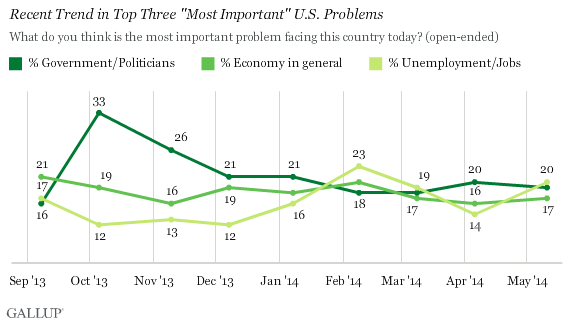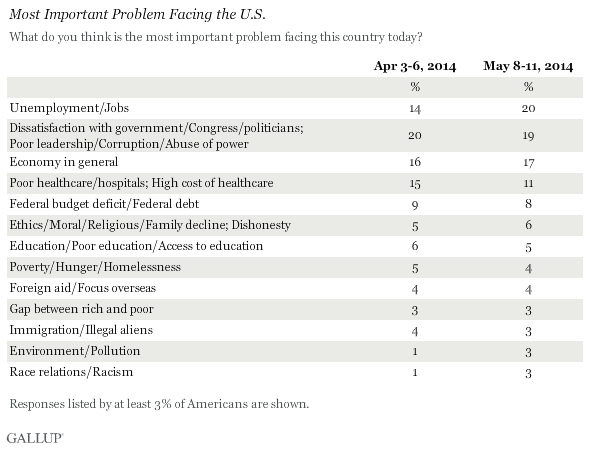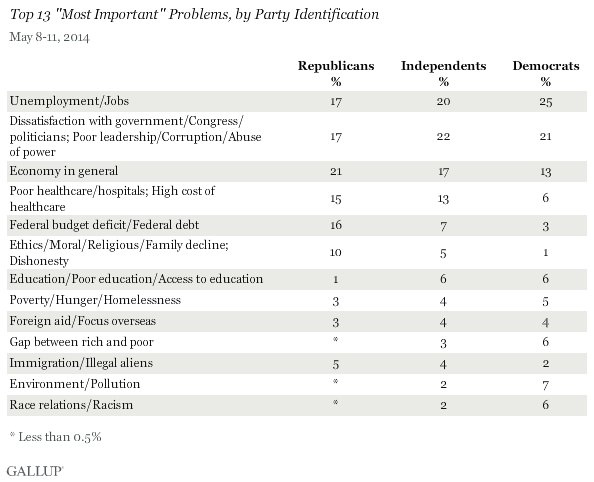May 19, 2014
Gallup Poll:
Jobs, Government, and Economy Remain Top U.S. Problems
Twenty percent mention unemployment or jobs, up from 14% in April
WASHINGTON, D.C. -- Twenty percent of Americans
name unemployment or jobs as the most important problem facing the
country in May, up from 14% who mentioned these issues in April.
Dysfunctional government (19%) and the economy in general (17%) also
rank among the top problems.
 These three issues -- jobs, economy, and government -- have been at
the top of the "most important problem" list since the beginning of the
year. Mentions of government and politicians rose sharply to 33% in
October amid the partial government shutdown, but have dipped back down.
These three issues -- jobs, economy, and government -- have been at
the top of the "most important problem" list since the beginning of the
year. Mentions of government and politicians rose sharply to 33% in
October amid the partial government shutdown, but have dipped back down.
Mentions of the environment as the most important problem have ticked up to 3% in May from an average of 1% over the past six months. The increase may be related to recent news coverage highlighting the negative effects of global warming and climate change on the environment.
 Democrats Say Unemployment Is Top Problem, Republicans Say the Economy
Democrats Say Unemployment Is Top Problem, Republicans Say the Economy
Democrats are most likely to name jobs or unemployment as the country's most important problem, whereas Republicans' top response is the economy more generally. Democrats, Republicans, and independents are about equally likely to cite dissatisfaction with government. The federal budget deficit is a much larger concern among Republicans (16%) than among independents (7%) and Democrats (3%).
 Democrats are much more likely to mention the environment as the top
problem than are independents and Republicans. Democrats are more likely
than Republicans to list several social issues, such race relations,
the gap between rich and poor, and education. At least 6% of Democrats
cite these issues compared with 1% or fewer Republicans. On the other
hand, Republicans are more likely than Democrats to list moral and
ethical decline and the economy in general as the most important
problem.
Democrats are much more likely to mention the environment as the top
problem than are independents and Republicans. Democrats are more likely
than Republicans to list several social issues, such race relations,
the gap between rich and poor, and education. At least 6% of Democrats
cite these issues compared with 1% or fewer Republicans. On the other
hand, Republicans are more likely than Democrats to list moral and
ethical decline and the economy in general as the most important
problem.
Bottom Line
Americans are about equally likely to name unemployment and dissatisfaction with government as the most important problems facing the U.S., with the economy in general following closely behind. These issues have ranked at the top of the most important problem list since the beginning of 2014.
Despite recent congressional budget compromises, nearly one in five Americans still cite government itself as the nation's top problem. And even though U.S. workers report an increase in net hiring, unemployment and jobs remain at the top of the list.

Mentions of the environment as the most important problem have ticked up to 3% in May from an average of 1% over the past six months. The increase may be related to recent news coverage highlighting the negative effects of global warming and climate change on the environment.

Democrats are most likely to name jobs or unemployment as the country's most important problem, whereas Republicans' top response is the economy more generally. Democrats, Republicans, and independents are about equally likely to cite dissatisfaction with government. The federal budget deficit is a much larger concern among Republicans (16%) than among independents (7%) and Democrats (3%).

Bottom Line
Americans are about equally likely to name unemployment and dissatisfaction with government as the most important problems facing the U.S., with the economy in general following closely behind. These issues have ranked at the top of the most important problem list since the beginning of 2014.
Despite recent congressional budget compromises, nearly one in five Americans still cite government itself as the nation's top problem. And even though U.S. workers report an increase in net hiring, unemployment and jobs remain at the top of the list.
Survey Methods
Results Results for this Gallup poll are based on telephone
interviews conducted May 8-11, 2014, with a random sample of 1,028
adults, aged 18 and older, living in all 50 U.S. states and the District
of Columbia.
For results based on the total sample of national adults, the margin of sampling error is ±4 percentage points at the 95% confidence level.
Interviews are conducted with respondents on landline telephones and cellular phones, with interviews conducted in Spanish for respondents who are primarily Spanish-speaking. Each sample of national adults includes a minimum quota of 50% cellphone respondents and 50% landline respondents, with additional minimum quotas by time zone within region. Landline and cellular telephone numbers are selected using random-digit-dial methods. Landline respondents are chosen at random within each household on the basis of which member had the most recent birthday.
Samples are weighted to correct for unequal selection probability, nonresponse, and double coverage of landline and cell users in the two sampling frames. They are also weighted to match the national demographics of gender, age, race, Hispanic ethnicity, education, region, population density, and phone status (cellphone only/landline only/both, and cellphone mostly). Demographic weighting targets are based on the most recent Current Population Survey figures for the aged 18 and older U.S. population. Phone status targets are based on the most recent National Health Interview Survey. Population density targets are based on the most recent U.S. census. All reported margins of sampling error include the computed design effects for weighting.
In addition to sampling error, question wording and practical difficulties in conducting surveys can introduce error or bias into the findings of public opinion polls.
View survey methodology, complete question responses, and trends.
For more details on Gallup's polling methodology, visit www.gallup.com.
For results based on the total sample of national adults, the margin of sampling error is ±4 percentage points at the 95% confidence level.
Interviews are conducted with respondents on landline telephones and cellular phones, with interviews conducted in Spanish for respondents who are primarily Spanish-speaking. Each sample of national adults includes a minimum quota of 50% cellphone respondents and 50% landline respondents, with additional minimum quotas by time zone within region. Landline and cellular telephone numbers are selected using random-digit-dial methods. Landline respondents are chosen at random within each household on the basis of which member had the most recent birthday.
Samples are weighted to correct for unequal selection probability, nonresponse, and double coverage of landline and cell users in the two sampling frames. They are also weighted to match the national demographics of gender, age, race, Hispanic ethnicity, education, region, population density, and phone status (cellphone only/landline only/both, and cellphone mostly). Demographic weighting targets are based on the most recent Current Population Survey figures for the aged 18 and older U.S. population. Phone status targets are based on the most recent National Health Interview Survey. Population density targets are based on the most recent U.S. census. All reported margins of sampling error include the computed design effects for weighting.
In addition to sampling error, question wording and practical difficulties in conducting surveys can introduce error or bias into the findings of public opinion polls.
View survey methodology, complete question responses, and trends.
For more details on Gallup's polling methodology, visit www.gallup.com.
Sign up for Gallup e-mail alerts or RSS feeds
http://www.gallup.com/poll/169289/jobs-government-economy-remain-top-problems.aspx
Here's what We The People can do here now:
2014: It's time to work to elect Constitutional Independent Representatives.
Regards,
Richard <Ricardo Carlos> Charles
Feel free to share this alert with significant others to leaven the way for justice, liberty, life, opportunity, peace and prosperity for all
Here's what We The People can do here now:
2014: It's time to work to elect Constitutional Independent Representatives.
Regards,
Richard <Ricardo Carlos> Charles
Now
voters may better appreciate why we are taking
on the responsibility of the Nevada Libertarian Party
nominated Common Sense Fresh Start Politics of
Prosperity Constitutional Campaign for
US Representative in Las Vegas District 1.
Join the campaign for Constitutional Government with more Justice, Life, Liberty, Peace and Prosperity for All.
on the responsibility of the Nevada Libertarian Party
nominated Common Sense Fresh Start Politics of
Prosperity Constitutional Campaign for
US Representative in Las Vegas District 1.
Join the campaign for Constitutional Government with more Justice, Life, Liberty, Peace and Prosperity for All.
Compra Los Documentos Fundadores EstadoUnidenses
en el Espanol, aqui':
https://www.createspace.com/4677401
http://www.amazon.com/dp/B00IX3Q5I2
http://www.amazon.com/Project-Fresh-Start-Politics-Prosperity/dp/149213452X
Get the campaign eBook here:
http://www.amazon.com/Project-Fresh-Start-Politics-Prosperity-ebook/dp/B00ENPP7WE
Register to vote Libertarian in Las Vegas here:
http://www.clarkcountynv.gov/depts/election/pages/registertovote.aspx
http://www.clarkcountynv.gov/depts/election/pages/registertovote.aspx
http://nvsos.gov/index.aspx?page=703
Tweet the campaign here:
https://twitter.com/RichardCharlesI
Support our Americans First Common Sense
Constitutional campaign here, $100 or less per election,
registered voters only, thanks:
Feel free to share this alert with significant others to leaven the way for justice, liberty, life, opportunity, peace and prosperity for all
No comments:
Post a Comment